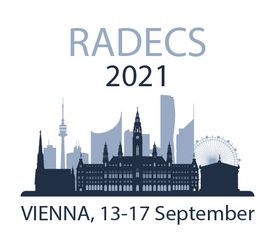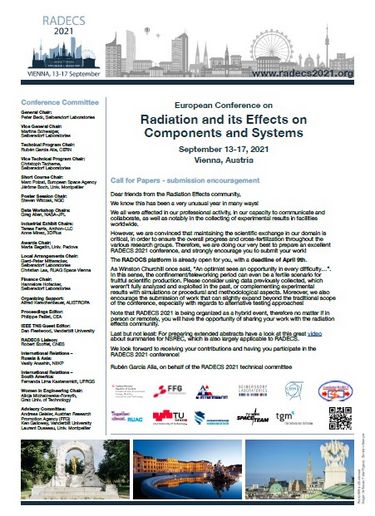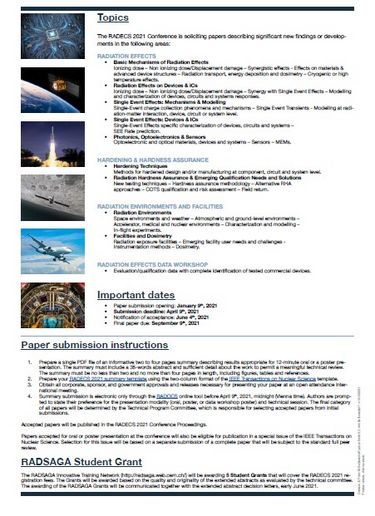Call for Papers - submission encouragement
Dear friends from the Radiation Effects community,
We know this has been a very unusual year in many ways!
We all were affected in our professional activity, in our capacity to communicate and collaborate, as well as notably in the collecting of experimental results in facilities worldwide.
However, we are convinced that maintaining the scientific exchange in our domain is critical, in order to ensure the overall progress and cross-fertilization throughout the various research groups. Therefore, we are doing our very best to prepare an excellent RADECS 2021 conference, and strongly encourage you to submit your work!
The RADOCS platform is already open for you, with a deadline of April 9th.
As Winston Churchill once said, “An optimist sees an opportunity in every difficulty…”. In this sense, the confinement/teleworking period can even be a fertile scenario for fruitful scientific production. Please consider using data previously collected, which weren’t fully analyzed and exploited in the past, or complementing experimental results with simulations or procedural and methodological aspects. Moreover, we also encourage the submission of work that can slightly expand beyond the traditional scope of the conference, especially with regards to alternative testing approaches!
Note that RADECS 2021 is being organized as a hybrid event, therefore no matter if in person or remotely, you will have the opportunity of sharing your work with the radiation effects community.
Last but not least: For preparing extended abstracts have a look at this great video about summaries for NSREC, which is also largely applicable to RADECS.
We look forward to receiving your contributions and having you participate in the RADECS 2021 conference!
Rubén García Alía, on behalf of the RADECS 2021 technical committee
Topics
The RADECS 2021 Conference is soliciting papers describing significant new findings or developments in the following areas:
RADIATION EFFECTS
- Basic Mechanisms of Radiation Effects
Ionizing dose – Non ionizing dose/Displacement damage – Synergistic effects - Effects on materials & advanced device structures – Radiation transport, energy deposition and dosimetry – Cryogenic or high temperature effects.
- Radiation Effects on Devices & ICs
Ionizing dose – Non ionizing dose/Displacement damage – Synergy with Single Event Effects – Modelling and characterization of devices, circuits and systems responses.
- Single Event Effects: Mechanisms & Modelling
Single-Event charge collection phenomena and mechanisms – Single Event Transients - Modelling at radiation-matter interaction, device, circuit or system level.
- Single Event Effects: Devices & ICs
Single-Event Effects specific characterization of devices, circuits and systems – SEE Rate prediction.
- Photonics, Optoelectronics & Sensors
Optoelectronic and optical materials, devices and systems – Sensors – MEMs
HARDENING & HARDNESS ASSURANCE
- Hardening Techniques
Methods for hardened design and/or manufacturing at component, circuit and system level.
- Radiation Hardness Assurance & Emerging Qualification Needs and Solutions
New testing techniques – Hardness assurance methodology – Alternative RHA approaches – COTS qualification and risk assessment – Field return.
RADIATION ENVIRONMENTS AND FACILITIES
- Radiation Environments
Space environments and weather – Atmospheric and ground-level environments – Accelerator, medical and nuclear environments – Characterization and modelling – In-flight experiments.
- Facilities and Dosimetry
Radiation exposure facilities – Emerging facility user needs and challenges - Instrumentation methods – Dosimetry.
RADIATION EFFECTS DATA WORKSHOP
- Evaluation/qualification data with complete identification of tested commercial devices.
Important dates
- Paper submission opening: January 9th, 2021
- Submission deadline: April 9th, 2021
- Notification of acceptance: June 4th, 2021
- Final paper due: September 8th, 2021
- IEEE TNS RADECS 2021 Special Issue due: October 8th, 2021 author instructions
Paper submission instructions
- Prepare a single PDF file of an informative two to four pages summary describing results appropriate for 12-minute oral or a poster presentation. The summary must include a 35-words abstract and sufficient detail about the work to permit a meaningful technical review. The summary must be no less than two and no more than four pages in length, including figures, tables and references.
- Prepare your RADECS 2021 summary template using the two-column format of the IEEE Transactions on Nuclear Science template.
- Obtain all corporate, sponsor, and government approvals and releases necessary for presenting your paper at an open attendance international meeting.
- Summary submission is electronic only through the RADOCS online tool before April 9th, 2021, midnight (Vienna time). Authors are prompted to state their preference for the presentation modality (oral, poster, or data workshop poster) and technical session. The final category of all papers will be determined by the Technical Program Committee, which is responsible for selecting accepted papers from initial submissions.
Accepted papers will be published in the RADECS 2021 Conference Proceedings.
Papers accepted for oral or poster presentation at the conference will also be eligible for publication in a special issue of the IEEE Transactions on Nuclear Science. Selection for this issue will be based on a separate submission of a complete paper that will be subject to the standard full peer review.
RADSAGA Student Grant
The RADSAGA Innovative Training Network (http://radsaga.web.cern.ch/) will be awarding 5 Student Grants that will cover the RADECS 2021 registration fees. The Grants will be awarded based on the quality and originality of the extended abstracts as evaluated by the technical committee. The awarding of the RADSAGA Grants will be communicated together with the extended abstract decision letters, early June 2021.
















